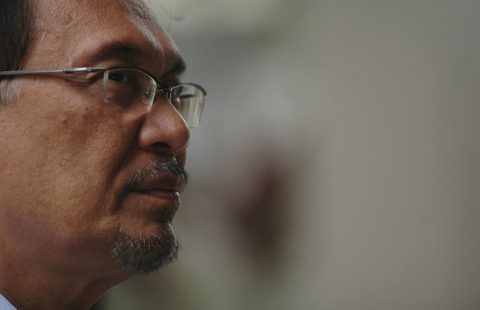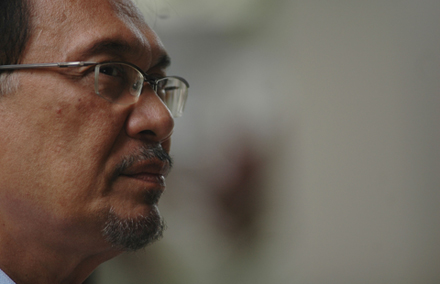As Anwar Ibrahim’s fate hangs in the balance, Malaysia’s democratic chances are slipping further away, writes James Giggacher.
Malaysia’s long-time opposition leader Anwar Ibrahim’s fate still hangs in the balance; his political future as tenuous as the sodomy charges brought against him.
Since October 27 he has been fighting a five-year jail sentence for allegedly sodomising an aide handed down by the nation’s Appeals Court in March – itself an overturning of an earlier acquittal by the High Court.
It’s the second time Anwar’s faced sodomy charges, the first being in 1998 during the failed ‘reformasi’ movement. If the Federal Court upholds this latest conviction, Anwar will also lose his status as an MP and not be allowed to engage in politics for years.
Anwar’s rejected the idea of living in exile to stay in Malaysia and face the charges. It’s his final appeal. A bold, courageous move; maybe a stupid one born from his unfailing naivety about the prospects for political freedom in his homeland.
It’s not the ‘crime’ he is charged with, or the evidence given in this final courtroom charade (underpants and KY jelly have featured), that is truly sordid. Rather, it is what the whole sorry saga says about the declining prospects for democracy in Malaysia.
Many inside and outside the country see the charges as nothing more than politically motivated and trumped up – the latest shot in a long running war against the most powerful threat to ruling coalition, Barisan Nasional.
“The ‘sodomy’ charges against Anwar Ibrahim are a blatant attempt by the Malaysian authorities to silence and undermine a critical voice,” said Amnesty International in a statement the day the court case started. “If Anwar Ibrahim is jailed, Amnesty International will consider him a prisoner of conscience.”
Anwar and his Pakatan Rakyat (People’s Alliance) coalition took incumbent Prime Minister Najib Razak and Barisan Nasional to the line in last year’s general elections, winning 51 per cent of the popular vote, but only 40 per cent of seats in parliament.
But while GE13 was billed as the democratic dawn many had longed for so long, Anwar once again found himself on the sidelines. With no one to take up the mantle, the 67-year-old still finds himself leader of Malaysia’s “rainbow” opposition.
The ‘gerrymandering’ of seats saw Barisan Nasional win the election by 133 seats to 89. The result, their narrowest parliamentary win and worst result ever, spooked those who have ruled Malaysia uninterrupted since independence in 1957 using a volatile mix of ethnic-based politics and emergency powers, all managed by the velvet glove of economic growth.
This was compounded by the election results of five years prior; Barisan’s eroding base is a trend which had begun in 2008, when it failed to win the ‘moral victory’ of a two-thirds majority in parliament. Yet, a general upswing in support since then, let alone winning the popular vote in 2013, wasn’t enough to see the opposition remove Barisan’s grip on power. It’s largely because the political deck is stacked in their favour.
While the elections were “partially” free, according to key regional think tanks, they were far from fair.
ANU political scientist Edward Aspinall points to gerrymandering, as well as the fuzzy line between the state and government as key reasons why Barisan held onto government despite losing the popular vote. More worrying, they are indicators of Malaysia’s increasingly less than democratic system.
His colleague Ross Tapsell has also highlighted how Barisan were able to maintain control and domination over the mainstream media during the elections, even in the face of apparent freedoms brought in by online and social media.
GE13 also saw widespread claims of electoral fraud and irregularities; particularly around the integrity of the electoral roll, postal and early votes, and polling – all pointed out by Bridget Welsh at the Center for East Asia Democratic Studies.
Instances of vote-buying and fly-in voters corralled to cast their ballots for Barisan were clear on the day. Meredith Weiss, a researcher from SUNY monitored the election campaign as part of a research project funded by ANU.
“Today has been punctuated most notably by calls of Bangladeshis, Indonesians, Filipinos, and other migrant workers, allegedly gifted with identity cards, then transported by the plane load to wherever their votes (for Barisan Nasional of course) are most needed,” she wrote for New Mandala last May.
But it’s more than dirty politics at play; at the heart of the Anwar case is a Malaysia where political freedom is in freefall.
Human Rights Watch says that since his shaky victory in GE13, Najib Razak has ushered in an era of deteriorating rights – including new and revised laws permitting detention without trial, arrests of opposition activists for peaceful protests, and attempts to shut down human rights NGOs.
Then there is the archaic Sedition Act.
Provisions of the sedition law are extremely wide-ranging, and as Human Rights Watch notes, the way the law is worded makes it almost impossible to refute in court.
“The Sedition Act prohibits vague offenses such as uttering ‘any seditious words’ without defining what constitutes ‘sedition’ or ‘seditious words’. It broadly outlaws any ‘seditious tendency’ that would ‘bring into hatred or contempt or excite disaffection against any Ruler or against any Government’,” reads an online statement.
Since May this year around 20 sedition charges have been laid or enquiries initiated, against opposition leaders, activists, university scholars, journalists and students – despite Prime Minister Razak promising in July 2012 to repeal this catch-all act from a “bygone era”.
Legal proceedings are also still ongoing against two politicians and one NGO leader charged with sedition last year. Amnesty Intentional point to scores of others under investigation. Others say the number is as high as 40.
One of those is Rafizi Ramli – a 37-year-old politician from the opposition’s People’s Justice Party who has gained widespread prominence after a series of high-level corruption exposes.
Ramli is currently under investigation for writing about Anwar’s second sodomy case, and has also recently been charged under the Penal Code over a statement he made in February alleging political attempts to create racial and religious discord in Selangor.
In a recent interview with New Mandala Ramli pointed out the dire times for Malaysia’s democracy, opposition and Anwar.
“Of course you have to be hopeful [for Anwar]. Being an opposition party that was born out of a personal tragedy that happened to him, we can only survive by remaining hopeful. So we remain hopeful that his ‘so-called’ legal problem orchestrated by the government will end very soon,” said Ramli.
“Yet at the same time we are very realistic that he will remain a galvanising figure against the ruling party, and so long as he is actively engaged with the public… we have to remain realistic that there is a high possibility he will be sent to prison again.”
Of course none of this touches on the economic stagnation that Malaysia is currently trying to beat off. Will the velvet glove finally slip? If Anwar and the broader opposition’s situation is anything to go by, it’s already been replaced by a clenched fist.
James Giggacher is Asia Pacific editor at the Australian National University’s College of Asia and the Pacific. His views do not represent the University’s or the College’s.
 Facebook
Facebook  Twitter
Twitter  Soundcloud
Soundcloud  Youtube
Youtube  Rss
Rss 
